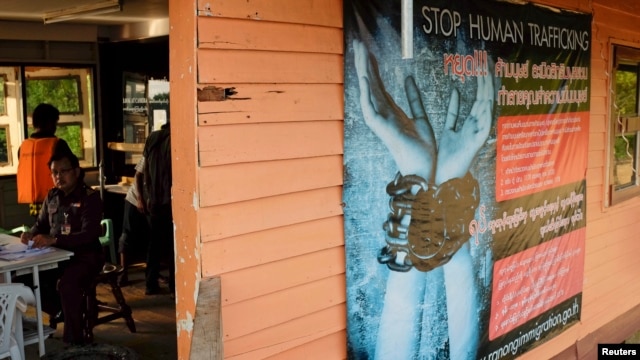BANGKOK — The United Nations called on Friday for an urgent investigation into allegations in a Reuters report that Thai immigration officials moved Burma refugees into human trafficking rings.
The report, published on Thursday and based on a two-month investigation in three countries, revealed a clandestine policy to remove Rohingya refugees from Thailand's immigration detention centers and deliver them to human traffickers waiting at sea.
 |
| A Thai police immigration post in the port city of Ranong in southern Thailand Oct. 30, 2013. |
The Rohingya, stateless Muslims from Burma, are then transported across southern Thailand and held hostage in camps hidden near the border with Malaysia until relatives pay ransoms to release them, according to the Reuters report. Some are beaten and some are killed.
“These allegations need to be investigated urgently,” U.N. refugee agency spokeswoman Vivian Tan said in a statement. “We have consistently asked countries in the region to provide temporary protection, including protection against abuse and exploitation.”
Maj. Gen. Chatchawal of the Royal Thai Police in Bangkok said in the report there was an unofficial policy to deport the Rohingya to Burma. He called this “a natural way or option two.” But he said the Rohingya signed statements in which they agree they want to return to Burma.
These statements, however, were at times produced in the absence of a Rohingya language translator.
“The detainees also need to be informed about their options in a language they understand. Any decision to leave must be voluntary, and those who choose to leave must be protected against abuse and exploitation by smugglers,” said Tan.
Rights group seeks explanation
A senior official at New York-based Human Rights Watch criticized Thailand for moving detainees into established smuggling and trafficking rings and warned Thailand could face a possible downgrade in a U.S. list of the world's worst offenders in fighting human trafficking.
Such a downgrade would place Thailand, a close U.S. ally and Southeast Asia's second-biggest economy, on par with North Korea, Iran and Saudi Arabia among the worst offenders in fighting human trafficking, which could lead to U.S. sanctions.
“The Thai government has some serious explaining to do before the international community,” said Phil Robertson, deputy Asia director at Human Rights Watch.
The U.S. State Department is gathering information for its next Trafficking In Persons (TIP) report, due to be published in June. Thailand faces an automatic downgrade to Tier 3, the lowest rank, unless it makes “significant efforts” to improve its record in combating trafficking, the State Department says.
“Unless Thailand makes it a top priority to clean these rackets up, and investigate and prosecute all those involved, Bangkok should kiss goodbye any prospect of escaping Tier 3 in the annual U.S. anti-trafficking report,” Robertson said.
Sek Wannamethee, a spokesman for Thailand's Foreign Ministry, said the Rohingya issue was one of several the United States would take into consideration before deciding whether to downgrade or upgrade Thailand.
“The United States will look at the overall progress of Thailand,” he said. “The focus is on persecution and convictions and Thailand has made substantive progress.”
The numbers, however, suggest enforcement is losing steam. Nine people have been arrested in Thailand in relation to Rohingya-smuggling in 2013, including two government officials, according to police data. None of the arrests has led to convictions, however.
Thailand prosecuted 27 people for trafficking in 2012, down from 67 the previous year, according to the 2013 TIP Report. Only 10 of those prosecutions - one of them an official - resulted in convictions, the report said.
Clashes between Rohingya and ethnic Rakhine Buddhists exploded in Burma last year, making 140,000 people homeless, most of them Rohingya. Since then, tens of thousands of Rohingya have fled from Burma by boat.
No comments:
Post a Comment